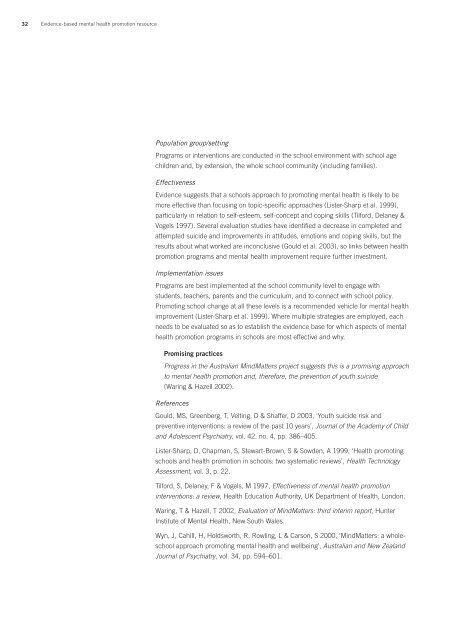Evidence-based mental health promotion resource - health.vic.gov.au
Evidence-based mental health promotion resource - health.vic.gov.au
Evidence-based mental health promotion resource - health.vic.gov.au
Create successful ePaper yourself
Turn your PDF publications into a flip-book with our unique Google optimized e-Paper software.
32 <strong>Evidence</strong>-<strong>based</strong> <strong>mental</strong> <strong>health</strong> <strong>promotion</strong> <strong>resource</strong>Population group/settingPrograms or interventions are conducted in the school environment with school agechildren and, by extension, the whole school community (including families).Effectiveness<strong>Evidence</strong> suggests that a schools approach to promoting <strong>mental</strong> <strong>health</strong> is likely to bemore effective than focusing on topic-specific approaches (Lister-Sharp et al. 1999),particularly in relation to self-esteem, self-concept and coping skills (Tilford, Delaney &Vogels 1997). Several evaluation studies have identified a decrease in completed andattempted suicide and improvements in attitudes, emotions and coping skills, but theresults about what worked are inconclusive (Gould et al. 2003), so links between <strong>health</strong><strong>promotion</strong> programs and <strong>mental</strong> <strong>health</strong> improvement require further investment.Implementation issuesPrograms are best implemented at the school community level to engage withstudents, teachers, parents and the curriculum, and to connect with school policy.Promoting school change at all these levels is a recommended vehicle for <strong>mental</strong> <strong>health</strong>improvement (Lister-Sharp et al. 1999). Where multiple strategies are employed, eachneeds to be evaluated so as to establish the evidence base for which aspects of <strong>mental</strong><strong>health</strong> <strong>promotion</strong> programs in schools are most effective and why.Promising practicesProgress in the Australian MindMatters project suggests this is a promising approachto <strong>mental</strong> <strong>health</strong> <strong>promotion</strong> and, therefore, the prevention of youth suicide(Waring & Hazell 2002).ReferencesGould, MS, Greenberg, T, Velting, D & Shaffer, D 2003, ‘Youth suicide risk andpreventive interventions: a review of the past 10 years’, Journal of the Academy of Childand Adolescent Psychiatry, vol. 42. no. 4, pp. 386–405.Lister-Sharp, D, Chapman, S, Stewart-Brown, S & Sowden, A 1999, ‘Health promotingschools and <strong>health</strong> <strong>promotion</strong> in schools: two systematic reviews’, Health TechnologyAssessment, vol. 3, p. 22.Tilford, S, Delaney, F & Vogels, M 1997, Effectiveness of <strong>mental</strong> <strong>health</strong> <strong>promotion</strong>interventions: a review, Health Education Authority, UK Department of Health, London.Waring, T & Hazell, T 2002, Evaluation of MindMatters: third interim report, HunterInstitute of Mental Health, New South Wales.Wyn, J, Cahill, H, Holdsworth, R, Rowling, L & Carson, S 2000, ‘MindMatters: a wholeschoolapproach promoting <strong>mental</strong> <strong>health</strong> and wellbeing’, Australian and New ZealandJournal of Psychiatry, vol. 34, pp. 594–601.



